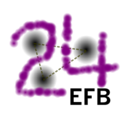Speaker
Description
Experimentally and theoretically, the study of the structure of the halo bound nuclei is nowadays an active research topic of interest. One of the reasons of this huge interest is that, being loosely bound, the halo nuclei, when used as projectiles in nuclear reactions, they can easily breakup. This immediately brings the question of which of the interactions between nuclear and Coulomb, plays a prominent role in the breakup. Thus, the nuclear-Coulomb interferences are of importance. Moreover, the easy breakup makes the breakup reactions a useful tool to study the structure and dynamics of the halo nuclei themselves. However, the full understanding of the dynamics of the breakup reactions, for example, the study of the breakup cross sections, is far from being established. Additionally, the influence of the breakup reactions on other reaction channels such as fusion (complete or incomplete) and elastic scattering breakup is yet to be fully understood. The latter point is underscored by the new data in Ref. [1], which cannot be understood in terms of fusion and transfer cross sections, where the projectile is treated as a two-body system, making its interaction with the target a three-body problem. In this work, we perform the four-body analysis of the breakup reactions involving halo projectiles. This is relatively a difficult problem, which needs innovative techniques in order to have numerical traction. We use the configuration space Faddeev-Yakubovsky equations for our formalism, and computationally we use the GPU-based calculations of our newly developed four-body numerical technique [2].
References
1. D Chattopadhyaya, et al. Phys. Rev. C94, 061602(R) (2016).
2. K Chitakwa [Private Communication].
*Corresponding author

